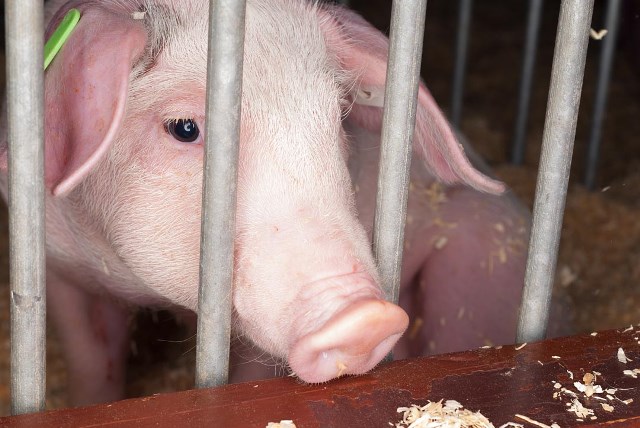Today’s publication of the Business Benchmark on Animal Welfare (BBFAW) reveals that most global food giants (95%) acknowledge the importance of animal welfare and are addressing it with policy commitments and clearer governance.
Few however are reporting successful implementation of these ambitions with 93% given the lowest ratings (‘E’ or ‘F’) for ‘Performance Impact’ – i.e. an assessment of the tangible impacts on the lives of farm animals reared for food in corporate supply chains. For example, progress on issues such as the time farm animals spend in live transportation, or in close confinement such as gestation crates, remains disappointingly slow.
A total of 150 global food producers, retailers and food-service companies with combined revenues of more than US$4.9 trillion, including the likes of McDonalds, Tesco and Tyson Foods, were ranked by BBFAW, which this year introduced tougher assessment criteria and an increased focus on ’Performance Impact’, and included new questions on how companies are recognising the need to reduce reliance on animal sourced foods and diversify into alternative proteins.
BBFAW was originally launched in 2012 and remains the leading global assessment of companies’ farm animal welfare policies and practices. It is supported by partners Compassion in World Farming and FOUR PAWS and by a coalition of institutional investors, managing over $1.9 trillion in assets who will engage with the companies in the year ahead to drive improvement.
This year’s benchmark found several encouraging signs as it set a new baseline for corporate performance, including:
- The vast majority of benchmarked companies (95%) now identify farm animal welfare as a relevant business issue, up from 79% in 2012.
- Three companies (Marks & Spencer, Premier Foods, Waitrose) achieved ‘Tier 2’ status, therefore demonstrating leadership in making farm animal welfare integral to their business strategy.
- The highest scoring companies on ‘Performance Impact’ – a measure for how well businesses demonstrate actual welfare benefits for farm animals in their global supply chain – were the six companies (4%) that achieved a ‘C’ rating: Marks & Spencer (UK), Groupe Danone (FR), Premier Foods (UK), Waitrose (UK), Cranswick PLC (UK) and Migros-Genossenschafts-Bund (Switzerland).
- There are generally high levels of ambition on cage-free eggs, with 73% of the 141 companies that have eggs in their supply chains now having cage-free egg commitments.
- A new section of the assessment found that 25% of benchmarked companies recognise the need to reduce reliance on animal sourced foods as a relevant business issue, with 21 companies including Greggs, Sodexo and Carrefour publishing time-bound targets to reduce reliance.
However, many findings in this year’s benchmark also showed the work that still needs to be done by the food sector:
- Implementation lags commitment: 93% of companies rated as ‘E’ or ‘F’ on ‘Performance Impact’, and no firm achieved the top ‘A’ or ‘B’ impact rating. Companies with the lowest ‘F’ impact rating include Amazon Whole Foods, Domino’s Pizza Inc, Müller and Tyson Foods.
- No policy: 19 global food companies, including Yum China Holdings (owners of KFC in China) and Domino’s Pizza Inc (US), have yet to even publish a formal farm animal welfare policy.
- Close confinement: 18% of companies, including Tyson Foods and WH Group (which includes large US pork producer Smithfield) have no policy commitment to end the use of close confinement. Only 9% of companies with pigs in their supply chain (13 of 137 companies) have set credible targets to end the use of ‘sow stalls’ or ‘gestation crates’ i.e. metal enclosures barely bigger than an adult pig which are banned in jurisdictions such as the UK, Sweden and several US states. BBFAW defines a credible target as a time-bound target that restricts crate use to no more than 4 hours, with those failing to meet this criteria including Walmart and Cargill.
- Routine mutilation: A majority of companies (52%) have no policy to manage routine mutilations – such as branding with hot irons or tail docking in pigs and cattle.
- Live transport: Only 27% of assessed companies report that live transportation of farm animals is restricted to short journeys only (i.e. 4 hours or less for poultry and rabbits, and 8 hours for other species).
- Antibiotics: Only 40% of companies have commitments in place to end prophylactic and routine metaphylactic antibiotic use – despite the risk of surging antibiotic resistance.
Nicky Amos, Executive Director of the BBFAW, said: “The BBFAW results show that for 95% of food companies protecting farm animal welfare is not about businesses doing good; it’s about good business.
“The Benchmark’s criteria have been strengthened in 2024, so it’s encouraging that several companies, including the three that achieved ‘Tier 2’ status, are leading by example and showing that high levels of progress are possible. It’s also highly encouraging that 1 in 4 food companies recognise the need to innovate to reduce reliance on animal sourced foods as part of long-term plans to create sustainable food supply chains.
“Today’s analysis shows there’s also a long way to go for the food sector to turn awareness and commitment into demonstrable animal welfare benefits, with large numbers of farmed animals still suffering from inhumane practices such as close confinement or routine mutilations.”
Abigail Herron, Global Head of Health and Nature Policy at Aviva investors – one of 32 institutional investors supporting BBFAW, said: “The Business Benchmark on Animal Welfare continues to be a valuable guide in helping investors analyse management quality in a systematic and consistent manner across the global food industry.
“Importantly, this data also exists at the intersection between critical issues including animal welfare and antimicrobial resistance, which present material financial risks to companies and shareholder returns.
“As an investor which regularly engages with companies operating in the global food sector, the BBAW helps to shine a light on those which are making critical progress towards addressing these challenges and enables us to analyse management quality in a systematic and consistent manner.”


